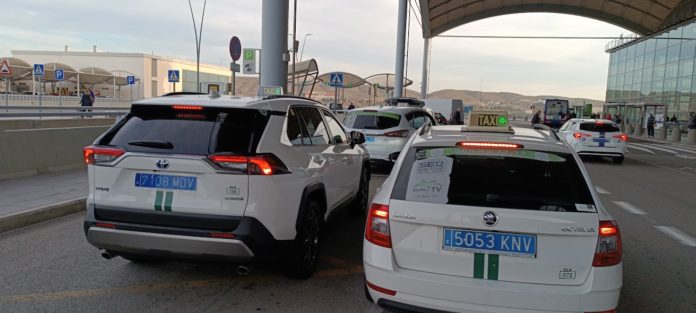The tourism sector is supporting a united front with the taxi drivers of the Costa Blanca, faced with a shortage of licenced vehicles, which, according to the tourism sector, is adding to a negative impact on the area. As such, the taxi drivers are considering action in the New Year to highlight the problems.
A shortage of legal taxis has been evident in a number of tourist centric towns such as Benidorm, Elche and Alicante, but the situation has been impossible at times at Alicante-Elche Miguel Hernadez airport, where a shortage of legal taxis has been hampered by those not allowed to pick up, the VTC private hire sector, and illegal pirate taxis all adding to the complications.
From the hotel association of the Costa Blanca, HOSBEC, its president, Fede Fuster, explains that the current fleet is insufficient and that in cities like Benidorm it is difficult at certain times to find a taxi. But they are especially concerned about the shortage at the Alicante-Elche Miguel Hernández airport, where complaints are multiplying, and Alicante taxis are not authorised to pick up passengers.
In fact, this lack accounts for between 30 and 40% of the negative aspects of their stays, according to what tourists report in the hotels’ internal questionnaires.
They have transferred the problem to the Ministry, without having obtained a solution at the moment, says Fuster.
There are also no alternatives such as Uber or Cabify, as there are in other communities. It’s not something they should regulate, they say. But “what is clear is that measures must be agreed upon”.
Fuster considers it “absurd” that both the City Councils and the Generalitat concentrate so much effort on attracting tourists or on requesting the expansion of airport runways, when they leave “the tourist who is already at the door” at their discretion.
Meanwhile, taxi drivers in Alicante mainly attribute the problem to occasional or infrequent pedestrianisation, and to the continuous street closures in the centre of the capital. An adequate service cannot be provided, says the president of Radio Teletaxi, Paco Sánchez, “for reasons beyond our control.”
Added to this is another problem, that of VTC’s competition, despite the fact that the moratorium already ended more than a year ago and its actions are, to say the least, “illegal,” Sánchez recalls. Not to mention the so-called tuk tuk tricycles that “run freely around the city, due to a legal loophole that the City Council has not yet resolved,” Sánchez laments.
As a result of the combined frustrations, the taxi associations plan to carry out a survey among their members and do not rule out mobilisations.





